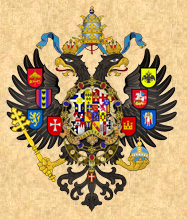|

Statement on the Sacred Continuity of Rome, Holy Russia,
and the Mission of the United Roman-Ruthenian Church
EN | IT | RU
from the Pontifical Court
Issued under the authority of the Office of the Prince-Bishop
5 February 2025

The
United Roman-Ruthenian Church and Pontifical Imperial State of
Rome-Ruthenia (collectively known as the Roman-Ruthenian Church and
State), as both an ecclesiastical and temporal body, upholds the sacred
inheritance of Christian civilization as it has been entrusted
throughout history. This inheritance, first given to Rome, was
transferred to New Rome, Constantinople, and later to Holy Russia, the
Third Rome.
Through the rightful transfer of ecclesiastical and temporal
succession, the Roman-Ruthenian Church and State now carries this sacred patrimony forward. The
temporal claims of the Roman Church, once abandoned, were inherited and transferred in
rightful succession by the Roman-Ruthenian Church and State, returning to the Church that preserves
the Apostolic and Orthodox faith. Likewise, the Kingship of Russia and
All Rus’, granted
first by the Byzantine Patriarch and then by the Roman Pope, returned,
after its illegal dissolution as a functioning state, to Rome, and from
there, inherited as part of the Roman-Ruthenian Church and State's
recognised temporal patrimony.
Thus, the Roman-Ruthenian Church and State is not merely a guardian of tradition—it is the
successor to Christian Rome, to Holy Russia, and to the sacred mission
of Christian kingship itself.
The Roman-Ruthenian Church and State:
-
Preserves the Apostolic Faith, maintaining the Orthodox and Catholic heritage of both Eastern and Western Christianity.
-
Holds the rightful succession of Christian kingship, inheriting the
sacred temporal patrimony that once belonged to the Roman Church and
the Kingship of All Rus’.
-
Guards the Christian patrimony, ensuring that the traditions, liturgy,
and sacred duties of Christian civilization do not perish.
-
The world has abandoned its divine inheritance, forsaking Christ’s
kingship for secularism, nationalism, and materialism. Yet Rome did not
die. Constantinople did not die. Holy Russia did not die. They live on
in those who remain faithful.
The Roman-Ruthenian
Church and State stands as the last true embodiment of this sacred
mission—not
seeking earthly empire, but preserving the eternal Christian
civilization that God entrusted to His faithful. As heirs to this
legacy, we affirm our brotherhood with all Orthodox and Catholic
Christians, particularly those of Roman, Russian, Slavic, Eastern
Roman, and Latin heritage, and all who uphold the traditions of the
undivided Church.
We call upon all who share in this inheritance to stand firm in Christ,
to reject the corruption of the world, and to uphold the apostolic
vision that has been passed down through the ages. The mission
continues.
Note:
The P.I. Household, as a matter of policy, is not involved and does not
seek to be involved in the governance, political parties, or politics
of any current civil government in any nation. The United
Roman-Ruthenian Church and the Pontifical Imperial State of
Rome-Ruthenia constitute an ecclesiastical sovereignty by right of Rome
as heir to the Roman Empire and Pontifical Kingdom of Ruthenia and All
Rus' with an independent government in special consultative status with
the United Nations Economic and Social Council. The United
Roman-Ruthenian Church is an autocephalous Catholicate. The governments
of the modern republics of Italy, German, France, Switzerland, Russia,
Belarus, Ukraine, and the United States, and of the modern kingdoms of
Great Britain and Spain, as well as the European Union and all other
civil states, are not affiliated with the United Roman-Ruthenian Church
and the Pontifical Imperial State.
|

